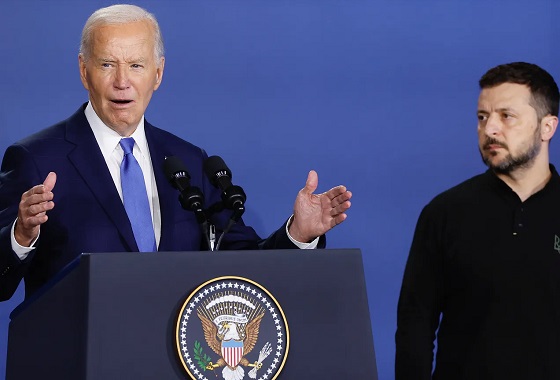Alberta
Alberta parents want balance—not bias—in the classroom

From the Fraser Institute
By Tegan Hill and Paige MacPherson
74 per cent of parents in Alberta believe teachers should present both sides of controversial issues (e.g. sexuality/gender, climate change) or avoid them entirely.
With the Alberta government set to test its new draft social studies curriculum in September, a new poll reveals a clear consensus: Alberta parents of K-12 children want schools to provide balance—not bias—in the classroom. And when it comes to controversial material in schools, they want to make their own choices for their children.
Specifically, the poll (conducted by Leger and commissioned by the Fraser Institute) found that 88 per cent of Alberta parents (with kids in public and independent schools) believe teachers and the provincial curriculum should focus on facts—not teacher interpretations of those facts, which may include opinions. Only 10 per cent of Alberta parents disagreed.
Moreover, despite ongoing debates in the media and among activists about K-12 school policies, curriculum development, controversial issues in the classroom and parental involvement, according to the poll, the vast majority of parents agree on how schools should handle these issues.
For example, 74 per cent of parents in Alberta believe teachers should present both sides of controversial issues (e.g. sexuality/gender, climate change) or avoid them entirely.
An overwhelming majority of Alberta parents (86 per cent) believe schools should provide advance notice when controversial topics will be discussed in class or during formal school activities. This isn’t surprising—many parents may want to discuss these issues with their children in advance.
In fact, when controversial topics arise, about three quarters (73 per cent) of Alberta parents believe parents should have the right to remove their children from those lessons without consequence to their children’s grades. Of the minority who do not believe parents should have this right, most said “children need to learn about all topics/viewpoints, regardless of their parents’ bias.”
And almost nine in 10 Alberta parents (89 per cent) believe classroom materials and conversations about potentially controversial topics should always be age appropriate.
These polling results should help inform provincial and school-level policies around parental information, consent, school curricula and teacher curriculum guides. For instance, given that parents overwhelmingly favour facts in classrooms, curriculum guides should require the teaching of specific details (e.g. the key players, dates and context of specific historical events). Currently, teachers are allowed to interpret events based on their opinions, which means students may hear completely different interpretations depending on the particular teacher.
While the preferences of parents with kids in K-12 schools are often presented as contentious in media and politics, polling data shows a clear consensus. Parents overwhelmingly value balance, not bias. They want their kids taught age-appropriate facts rather than opinions. And they expect prior notice before anything controversial happens in their kids’ schools. According to most parents in Alberta, none of these opinions are controversial.
Authors:
Alberta
Medical regulator stops short of revoking license of Alberta doctor skeptic of COVID vaccine

From LifeSiteNews
The Democracy Fund has announced that COVID-skeptic Dr. Roger Hodkinson will retain his medical license after a successful appeal against allegations of ‘unprofessional conduct’ by the College of Physicians and Surgeons of Alberta.
A doctor who called for officials to be jailed for being complicit in the “big kill” caused by COVID measures will get to keep his medical license thanks to a ruling by a Canadian medical regulator.
The Democracy Fund (TDF) announced in an April 4 press release that one of its clients, Dr. Roger Hodkinson, will retain his medical license after filing an appeal with the College of Physicians and Surgeons of Alberta (CPSA) over allegations of “unprofessional conduct regarding 17 public statements made in November 2020 and April 2021.”
Hodkinson had routinely argued against the dictates of public health and elected officials and “presented an alternative perspective on COVID-19, including the efficacy of masking and vaccines,” TDF noted.
In 2021, Hodkinson and Dr. Dennis Modry publicly blasted the then-provincial government of Alberta under Premier Jason Kenney for “intimidating” people “into compliance” with COVID-19 lockdowns.
In 2022, Hodkinson said that leaders in Canada and throughout the world have perpetrated the “biggest kill ever in medicine’s history” by coercing people into taking the experimental COVID injections and subjecting them to lengthy lockdowns.
These statements, among others, led the CPSA to claim that Hodkinson had promoted inaccurate or misleading information. “However, following negotiations with lawyers for The Democracy Fund, the CPSA limited its claims to arguing that Dr. Hodkinson’s comments violated the ethical code and extended beyond the scope of a general pathologist.”
Thus, Hodkinson did not “concede that any of his statements were false,” but “acknowledged that his criticisms of other physicians technically breached the Code of Ethics and Professionalism,” the group explained. “He also admitted that he should have clarified that his views were outside the scope of a general pathologist.”
Instead of having his license revoked, TDF stated that Dr. Hodkinson received a “caution” and will have to “complete an online course on influence and advocacy.”
“However, he did not concede that any of his statements were misinformation, nor did the tribunal make such a determination,” noted lawyer Alan Honner.
While Hodkinson received a slap on the wrist, a number of Canadian doctors have faced much harsher sanctions for warning about the experimental vaccines or other COVID protocols such as lockdowns, including the revocation of their medical licenses, as was the case with Dr. Mark Trozzi and others.
Some of Hodkinson’s warnings seem to have been vindicated by the current Alberta government under Premier Danielle Smith, who commissioned Dr. Gary Davidson to investigate the previous administration’s handling of COVID-19.
Davidson’s report, which was made public earlier this year, recommended the immediately halt of the experimental jabs for healthy children and teenagers, citing the risks the shots pose.
Alberta
Province introducing “Patient-Focused Funding Model” to fund acute care in Alberta

Alberta’s government is introducing a new acute care funding model, increasing the accountability, efficiency and volume of high-quality surgical delivery.
Currently, the health care system is primarily funded by a single grant made to Alberta Health Services to deliver health care across the province. This grant has grown by $3.4 billion since 2018-19, and although Alberta performed about 20,000 more surgeries this past year than at that time, this is not good enough. Albertans deserve surgical wait times that don’t just marginally improve but meet the medically recommended wait times for every single patient.
With Acute Care Alberta now fully operational, Alberta’s government is implementing reforms to acute care funding through a patient-focused funding (PFF) model, also known as activity-based funding, which pays hospitals based on the services they provide.
“The current global budgeting model has no incentives to increase volume, no accountability and no cost predictability for taxpayers. By switching to an activity-based funding model, our health care system will have built-in incentives to increase volume with high quality, cost predictability for taxpayers and accountability for all providers. This approach will increase transparency, lower wait times and attract more surgeons – helping deliver better health care for all Albertans, when and where they need it.”
Activity-based funding is based on the number and type of patients treated and the complexity of their care, incentivizing efficiency and ensuring that funding is tied to the actual care provided to patients. This funding model improves transparency, ensuring care is delivered at the right time and place as multiple organizations begin providing health services across the province.
“Exploring innovative ways to allocate funding within our health care system will ensure that Albertans receive the care they need, when they need it most. I am excited to see how this new approach will enhance the delivery of health care in Alberta.”
Patient-focused, or activity-based, funding has been successfully implemented in Australia and many European nations, including Sweden and Norway, to address wait times and access to health care services, and is currently used in both British Columbia and Ontario in various ways.
“It is clear that we need a new approach to manage the costs of delivering health care while ensuring Albertans receive the care they expect and deserve. Patient-focused funding will bring greater accountability to how health care dollars are being spent while also providing an incentive for quality care.”
This transition is part of Acute Care Alberta’s mandate to oversee and arrange for the delivery of acute care services such as surgeries, a role that was historically performed by AHS. With Alberta’s government funding more surgeries than ever, setting a record with 304,595 surgeries completed in 2023-24 and with 310,000 surgeries expected to have been completed in 2024-25, it is crucial that funding models evolve to keep pace with the growing demand and complexity of services.
“With AHS transitioning to a hospital-based services provider, it’s time we are bold and begin to explore how to make our health care system more efficient and manage the cost of care on a per patient basis. The transition to a PFF model will align funding with patient care needs, based on actual service demand and patient needs, reflecting the communities they serve.”
“Covenant Health welcomes a patient-focused approach to acute care funding that drives efficiency, accountability and performance while delivering the highest quality of care and services for all Albertans. As a trusted acute care provider, this model better aligns funding with outcomes and supports our unwavering commitment to patients.”
“Patient-focused hospital financing ties funding to activity. Hospitals are paid for the services they deliver. Efficiency may improve and surgical wait times may decrease. Further, hospital managers may be more accountable towards hospital spending patterns. These features ensure that patients receive quality care of the highest value.”
Leadership at Alberta Health and Acute Care Alberta will review relevant research and the experience of other jurisdictions, engage stakeholders and define and customize patient-focused funding in the Alberta context. This working group will also identify and run a pilot to determine where and how this approach can best be applied and implemented this fiscal year.
Final recommendations will be provided to the minister of health later this year, with implementation of patient-focused funding for select procedures across the system in 2026.
-

 2025 Federal Election2 days ago
2025 Federal Election2 days agoLiberals Replace Candidate Embroiled in Election Interference Scandal with Board Member of School Flagged in Canada’s Election Interference Inquiry
-

 Courageous Discourse1 day ago
Courageous Discourse1 day agoEurope Had 127,350 Cases of Measles in 2024
-

 2025 Federal Election2 days ago
2025 Federal Election2 days agoPierre Poilievre Declares War on Red Tape and Liberal Decay in Osoyoos
-

 Podcasts22 hours ago
Podcasts22 hours agoTrump’s Tariffs: The US, Canada, and the rest of the world
-

 Alberta2 days ago
Alberta2 days agoIs Canada’s Federation Fair?
-

 2025 Federal Election22 hours ago
2025 Federal Election22 hours agoMark Carney Comes to B.C. and Delivers a Masterclass in Liberal Arrogance
-

 COVID-192 days ago
COVID-192 days ago5 Stories the Media Buried This Week
-

 International2 days ago
International2 days agoBiden Lied About Everything, Including Nuclear Risk, During Ukraine Operation








